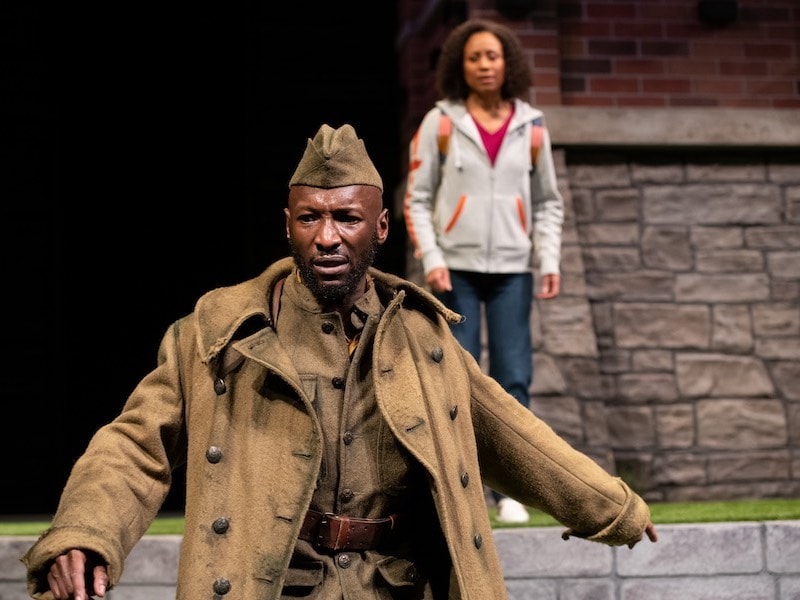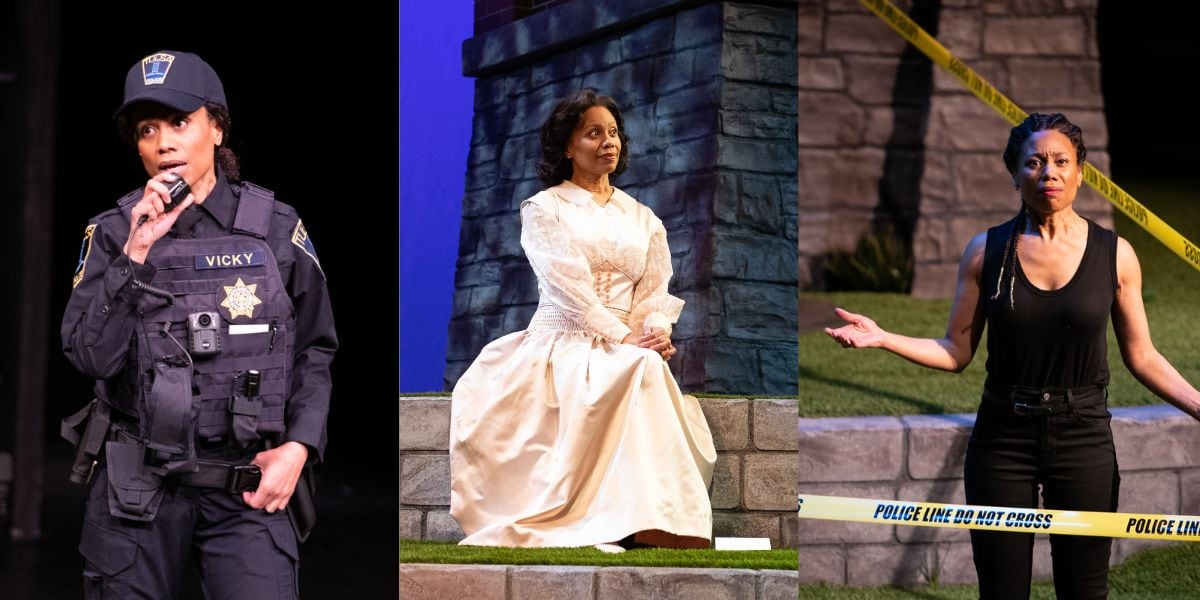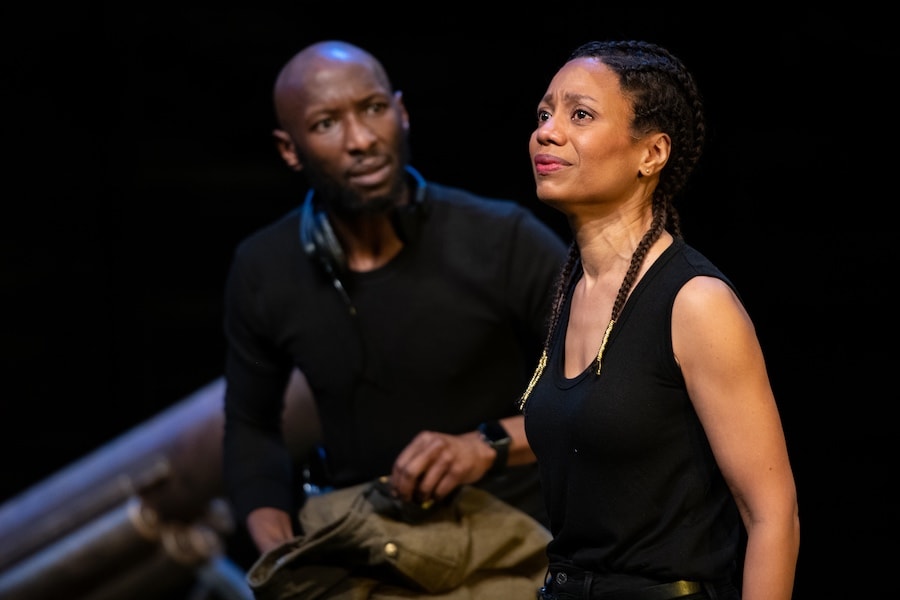On May 31, 1921, a tiny spark of racist innuendo exploded into a full-fledged race massacre in the Greenwood District of Tulsa, Oklahoma. When it subsided two days later, the entire community — a model of Black prosperity and achievement — lay in ruins and hundreds of its citizens were dead. Tragic as this episode was, an even more horrifying outcome was its complete erasure from American history. Not until its centennial in 2021 did the story of the Tulsa Race Massacre become widely known.
Playwright Nathan Alan Davis was among those who were shocked to learn of Tulsa’s tragedy. Commissioned by Arena Stage to write a new play for the theater’s Power Play cycle, Davis chose to explore the city’s grisliest chapter in The High Ground, a two-character, 70-minute meditation on love, loss, and the turbulence of unresolved racial animus, directed by Megan Sandberg-Zakian.

Davis adroitly centers his play atop Standpipe Hill, Tulsa’s high ground. In the early decades of the 20th century, it boasted a water tower, a symbol of the town’s oil-generated prosperity. In 1921, however, it became the point from which cannons fired down onto Greenwood, destroying a Black church and other buildings. Not until decades later was a modest plaque installed on the hill, marking its infamous role in the massacre.
The Soldier, beautifully played by Phillip James Brannon, haunts the high ground, decrying the hill’s tainted history and ridiculing the water tower’s new stewardship by Oklahoma State University. Dressed in his World War I military uniform, he embodies the dashed hopes of Black soldiers who expected their patriotism and service to be recognized when they returned home from the war. Instead, they faced renewed discrimination and, in the case of Tulsa, fatal encounters. A young woman named Victoria (Nehassaiu deGannes) tries to talk the Soldier down from the hill, as does Vicky, a Black policewoman (deGannes), whose unseen colleagues keep in radio contact, nervously awaiting any call she might make for additional support.
In subsequent scenes, deGannes nimbly plays two more roles — Vee, then Woman in Black — marking passages backward and forward in time. Each of the female characters engages the Soldier, recalling and reinterpreting the massacre and its aftermath, trying to reach him. The Soldier remains mired in anger, reminding us of how racial strife and violence remain a very real part of our present.

Davis takes a bold risk in centering his drama on the relationship between only two people, whose story is meant to symbolize the trauma Black Tulsans endured. His gamble largely pays off. As the play reaches its climax, the dialogue between the two characters crackles with truth-telling. We are witness to both universal feelings of torment and the gut-wrenching reverberations of the Tulsa race riot on individuals over time. Who died and who survived? How did the survivors pick up the pieces of their lives and move on, or not?

However, Davis might have benefitted by more fully trusting his audience to ride with him toward the bittersweet conclusion. Instead, he inserts a long, didactic soliloquy to expand on his theme. Forcefully delivered by deGannes, it nonetheless interrupts the dreamlike flow of the work.
The play is well-supported by set designer Paige Hathaway, who provides a suitably imposing Standpipe Hill, and by Sherrice Mojgani’s delicate, effective lighting design. Nathan Leigh’s original music and sound design underscore the play’s haunting, timeless quality.
The Kogod Cradle is a warm, welcoming setting for this addition to Arena’s Power Plays cycle, an ambitious series of 25 plays commissioned over a ten-year period. Each play represents a different decade in American history. Selecting Nathan Davis’ work (the ninth in the series) to represent the early 20th century was an inspired choice. Not only does his The High Ground shed new light on a tragic episode, but it also forces us to reconcile our imperfect past with the racism that still lingers in our national psyche.
Running Time: 70 minutes with no intermission
The High Ground plays through April 2, 2023, in the Kogod Cradle at Arena Stage, 1101 Sixth Street SW, Washington, DC. Tickets ($72–$115) may be purchased online, by phone at 202-488-3300 (Tuesday–Sunday, 12:00-8:00 p.m.), or in person at the Sales Office at 1101 Sixth Street SW, Washington, DC (Tuesday–Sunday, 12:00-8:00 p.m.). Arena Stage offers savings programs including “pay your age” tickets for those aged 30 and under, student discounts, and “Southwest Nights” for those living and working in the District’s Southwest neighborhood. To learn more, visit arenastage.org/savings-programs.
The program for The High Ground is online here.
Closed captions are available via the GalaPro app.
COVID Safety: Arena Stage requires that patrons wear facial masks while in its theaters. Arena additionally recommends, but no longer requires, that patrons wear masks in the Mead Center’s large open spaces, such as the Lower Lobby, Grand Lobby, Molly Smith Study, and café area. For up-to-date information, visit arenastage.org/safety.




